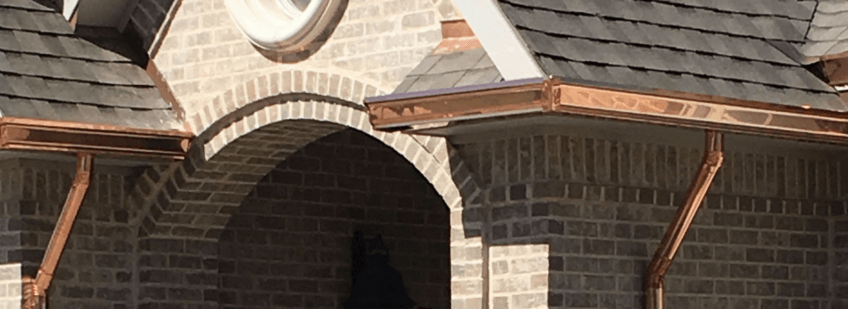Gutters are an essential addition to any home. No matter the climate you’re located in, gutters can prevent excess water from causing foundation issues and soil corrosion, and keep your yard healthy and beautiful. Although the choice to add gutters to your home is an easy one, choosing the material for your gutters can be a little more challenging. The four most common materials for gutters are aluminum, vinyl, copper and steel.
Key Takeaways
- The choice of gutter material affects durability and performance.
- Different materials offer various advantages and disadvantages.
- Understanding our options leads to better decisions for our homes.
The Best Materials for Gutters
Each one of these materials has their own set of pros and cons. We will dive into the features and drawbacks of each to help make your gutter material selection a little easier!
Aluminum
We’ve listed aluminum first on our list because it is the most commonly used material for gutters. Aluminum gutters are lightweight and rust-resistant, making them a durable choice for any home or property. There are also a wide range of colors and weight gauges available on the market today so you can fully customize the gutters to your home. Many DIYers select thinner-gauge aluminum gutters, while professionals use heavier-gauge aluminum to create their seamless gutters.
Pros
- Affordability: Cost wise, they are less expensive than many other options.
- Durability and Color Options: Aluminum gutters are also lightweight and available in a variety of colors.
- Low Maintenance & Repairs: They are fairly weather resistant, however, require maintenance over time to keep in proper condition.
Cons
- More Fragile: Due to the smaller weight of aluminum gutters, high winds and debris can damage them or create leaks.
- Sagging Over Time: If installed in long runs or not properly supported, aluminum gutters may sag over time, especially when exposed to heavy rain or snow.
- Not Ideal for Coastal Areas: Despite being corrosion-resistant, aluminum can still corrode in harsh coastal environments due to exposure to salty air and moisture.
- Durability in Extreme Climates: Aluminum may not be the best choice for homes in areas with extreme heat, cold, or heavy snow, as it can expand and contract with temperature changes.
Vinyl
Vinyl gutters are the least expensive gutter material, but they tend to become extremely brittle and the colors will fade from the sun and weather elements. It’s important to note that vinyl is not as sturdy as aluminum or other metal gutter materials, but because it’s so inexpensive and lightweight, many DIYers select vinyl as their gutter material of choice. Vinyl gutters are not especially durable, and you shouldn’t expect them to last as long as metal-based gutters.
Pros
- Affordability: Vinyl gutters are fairly inexpensive.
- Lightweight: The lightweight nature of vinyl gutters makes them easy to handle and install, whether you’re a DIY enthusiast or hiring a professional.
- Color Variety: Vinyl gutters are available in a wide range of colors, so you can easily find an option that complements your home’s exterior.
- Rust-Resistant: Additionally, they’re fade and rust resistant due to the material.
Cons
- Less Durable: Durability issues occur with vinyl gutters as over time they break down due to sun exposure.
- Prone to Cracking & Warping: When vinyl gutters crack, they’ll also have leak points at the joints.
- Limited Amount of Colors: A small number of color choices are only available.
- Limited Strength: Vinyl gutters may not withstand heavy rain, snow, or debris as well as their metal counterparts, making them less ideal for areas with harsh weather conditions.
Copper
Copper is the most expensive gutter material on our list and is usually only used on high-end new builds, or historic restorations. Not only does copper have a distinctive look, but it also is extremely rust-resistant and durable, so a copper gutter system can last for decades. To install copper gutters, professionals solder copper pieces together to create a seamless system. Overtime, copper gutters will patina and turn into a blue or green color. Copper gutters can only be installed by professionals.
Pros
- Incredible Durability: Many homeowners choose copper for their appearance, but it is also a stronger material than other gutter types.
- Corrosion-Resistant: Unlike other metals, copper is naturally resistant to rust and corrosion, making it ideal for a variety of climates, including coastal areas.
- Won’t Have to Repaint: You won’t have to worry about re-painting them or mildew accruing on their surface.
- Boosts Curb Appeal: Curb appeal is a big factor with copper gutters.
Cons
- High Cost: Copper is one of the most expensive gutter materials, both in terms of the material itself and the cost of installation.
- Change of Color: Although durable and not needing paint, patina naturally forms over copper creating a change in color over time.
- Difficult Installation & Repairs: Due to their weight and unique properties, copper gutters require skilled professionals for installation and repairs, which can add to the overall expense.
- Maintenance Needs: While durable, copper gutters may need special cleaning to maintain their shine and prevent premature patina development (if you prefer the original copper look).
Steel
Galvalume steel gutters continue to gain popularity as a more affordable alternative to copper gutters. Obviously, steel is an extremely strong metal, and galvalume steel gutters are dipped in an aluminum and zinc coating that is rust-resistant.The strength and weather-resistant properties of the galvalume steel makes it a great material option for gutters.
Pros
- Exceptional Durability: Galvanized steel gutters are very strong and coated with zinc.
- Ding and Dent Resistant: Unlike aluminum or vinyl, steel gutters hold up well against impacts like hail or falling branches without showing signs of damage.
- Handles Heavy Rainfall: Steel is strong enough to support large amounts of water, making it ideal for regions with frequent heavy downpours.
- Galvanized or Stainless Options: Choose from galvanized steel (zinc-coated for added protection) or stainless steel, both offering excellent performance and resistance to rust when properly maintained.
Cons
- Higher Cost: Steel gutters are more expensive than aluminum or vinyl, both for the materials themselves and the cost of installation.
- Heavy and Hard to Install: The weight of steel gutters makes them more challenging to handle and install, often requiring professional expertise.
- Rust Concerns: Galvanized steel rust and require regular cleanings to prevent that along with clogging. Leaf guards can also help keep them clog free.
- Maintenance Requirements: To prevent rust and extend their lifespan, steel gutters need regular cleaning and inspections to ensure the protective coating remains intact.
Gutter Material Comparisons
| Material | Cost | Durability | Aesthetics | Maintenance | Best For |
| Aluminum | $$ | High | Wide variety of colors/styles | Low | Most climates; versatile choice |
| Vinyl | $ | Moderate | Limited color options | Low | Budget-friendly, mild climates |
| Steel | $$$ | Very High (stainless) | Classic and rugged | Moderate (rusting possible) | Harsh climates, heavy rainfall |
| Copper | $$$$ | Extremely High | Luxurious, develops patina | Very Low | High-end or historic homes |
Factors to Consider When Choosing Gutter Materials
Selecting gutter materials involves considering budget, climate, aesthetics, material lifespan, and maintenance requirements to ensure a well-informed choice.
Continuous or Sectional Gutters
First, you’ll need to decide whether you want a continuous gutter or sectional system. Keep in mind sectional systems leak within the joints and seams. Continuous gutters are not only less prone to leaks, but also have greater curb appeal.
Consider Your Budget
Budget plays a significant role in choosing gutter materials. Aluminum is the most cost-effective option, offering durability and affordability. Copper gutters are stunning but expensive. While the initial investment is substantial, considering long-term benefits is crucial. If cost is the main concern, opting for aluminum or vinyl options is a wise choice.
Evaluate Your Climate
The choice of gutter materials depends on the local climate. Heavy rainfall areas require strong, durable materials like copper and stainless steel. Extreme temperatures can cause cracks or warping, while coastal areas should opt for rust-resistant materials like aluminum or copper.
Think About Your Aesthetic Preferences
When selecting gutter materials, consider aesthetic preferences. Copper, known for its unique appearance, can enhance a home’s style. Aluminum and steel offer a variety of colors and finishes, allowing for a closer match with the exterior. It’s crucial to consider how these materials align with the home’s architectural style to maintain visual harmony.
Factor in the Lifespan of the Material
Investing in copper or steel gutters is a long-term choice due to their durability and longevity. Copper gutters can last over 50 years with proper maintenance, while steel gutters typically last 20-30 years, depending on the coating. Aluminum and vinyl have shorter lifespans, around 20 years. Considering your home’s lifespan is crucial for a long-lasting gutter solution.
Maintenance requirements
Copper gutters are low-maintenance but resistant to rust and corrosion. Aluminum gutters are low-maintenance but can dent and require periodic cleaning. Steel gutters are durable but require regular maintenance to prevent rust. Vinyl gutters require minimal upkeep but can fade over time. Understanding these maintenance needs helps you choose a material that suits your lifestyle.
Conclusion
Choosing the right rain gutter material is crucial for protecting homes. Materials like copper can last over 50 years with minimal maintenance, while vinyl is budget-friendly. Aluminum is lightweight and resistant to rust, making it suitable for various climates. Local weather, budget, and home-style should be considered when choosing gutter materials.
For homeowners in the Amarillo area needing assistance with choosing and installing their next gutter system contact us today.

